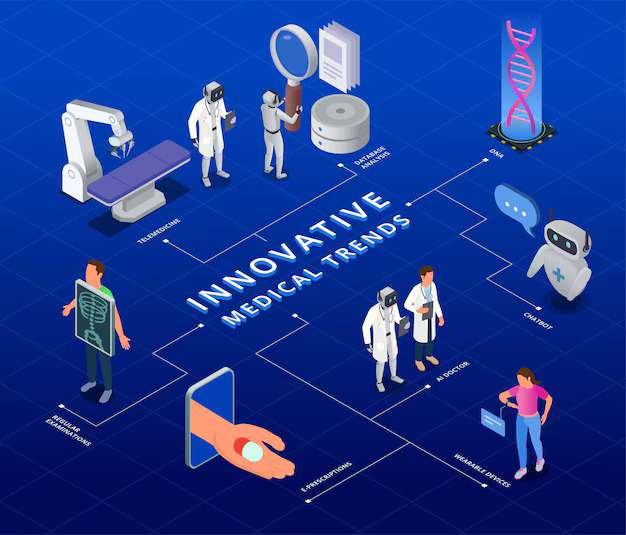Artificial Intelligence (AI) has revolutionized industries worldwide, and one of the most transformative applications is in the realm of healthcare. From early disease detection to personalized treatment plans, AI in healthcare is reshaping how patients are diagnosed, treated, and monitored, creating a future where medical care is more accurate, efficient, and accessible.
The Role of AI in Healthcare
AI leverages machine learning, natural language processing, and advanced data analytics to process vast amounts of medical information. With its ability to identify patterns and predict outcomes, AI is now an indispensable tool for healthcare professionals.
Early Diagnosis and Disease Prediction
One of the most impactful applications of AI in healthcare is in early diagnosis. AI-powered tools analyze medical images like X-rays, MRIs, and CT scans with exceptional precision, often detecting abnormalities earlier than human specialists. For example, AI systems have been developed to identify signs of cancer, heart disease, and neurological disorders with high accuracy.
Predictive analytics, another area where AI excels, uses historical and real-time data to anticipate potential health issues. This technology enables healthcare providers to intervene before conditions worsen, improving patient outcomes and reducing treatment costs.
Personalized Medicine
Every patient is unique, and AI in healthcare is facilitating the move toward personalized medicine. By analyzing genetic, environmental, and lifestyle factors, AI can recommend tailored treatments that are more effective for individual patients. This approach is particularly beneficial in managing chronic diseases like diabetes and cancer, where personalized plans can significantly enhance quality of life.
Virtual Health Assistants
AI-powered virtual assistants are transforming patient interactions. These digital tools provide 24/7 support by answering health-related queries, scheduling appointments, and even offering medication reminders. Virtual assistants enhance patient engagement and reduce the administrative burden on healthcare providers.
Drug Discovery and Development
The traditional drug discovery process is time-consuming and expensive. AI is speeding up this process by identifying potential drug candidates, predicting their efficacy, and simulating clinical trials. Companies leveraging AI in healthcare for drug development have already shortened timelines and reduced costs, bringing life-saving medications to market faster.
Remote Monitoring and Telemedicine
With the rise of wearable devices and telemedicine, AI plays a critical role in remote patient monitoring. Smart devices equipped with AI algorithms track vital signs, detect anomalies, and send alerts to healthcare providers. This technology is especially valuable for managing chronic conditions and reducing hospital readmissions.
Benefits of AI in Healthcare
The integration of AI in healthcare offers numerous advantages:
- Improved Accuracy: AI minimizes human error in diagnostics and treatment planning, leading to better patient outcomes.
- Cost Efficiency: Automation and predictive analytics help optimize resources, reducing healthcare costs.
- Enhanced Access: AI-powered tools expand access to healthcare, especially in remote and underserved areas.
- Faster Decision-Making: AI accelerates the analysis of medical data, enabling quicker and more informed decisions.
Challenges and Ethical Considerations
While the potential of AI in healthcare is immense, it comes with challenges. Data privacy and security are significant concerns, as AI relies on vast amounts of sensitive patient information. Ensuring that data is anonymized and protected is crucial to maintaining trust.
Additionally, the implementation of AI must address ethical issues, such as bias in algorithms. If AI systems are trained on unrepresentative data, they may produce inaccurate or discriminatory results. Ongoing efforts are required to develop fair and transparent AI systems.
Another challenge is the integration of AI into existing healthcare infrastructures. Training medical professionals to effectively use AI tools and ensuring interoperability between systems are essential for successful adoption.
The Future of AI in Healthcare
The future of AI in healthcare is bright, with ongoing advancements promising even greater innovations. Emerging trends include:
- AI-Powered Surgery: Robotic systems guided by AI are enhancing precision in surgical procedures, reducing recovery times and improving outcomes.
- Mental Health Applications: AI chatbots and apps are providing support for individuals with mental health conditions, offering accessible and affordable care.
- Genomics: AI is unlocking the potential of genomics, enabling breakthroughs in understanding genetic disorders and developing targeted therapies.
As AI continues to evolve, its integration into healthcare will only deepen, paving the way for a more efficient, equitable, and patient-centric system.
Conclusion
The adoption of AI in healthcare is transforming the medical landscape, offering unprecedented opportunities to improve patient care. From early diagnosis to personalized treatments and beyond, AI is making healthcare more accurate, accessible, and cost-effective. While challenges remain, ongoing advancements and ethical considerations will ensure that AI's potential is harnessed responsibly, shaping the future of medicine for the better.
By embracing AI, the healthcare industry is not only enhancing its capabilities but also paving the way for a healthier and more equitable world. As we move forward, the continued innovation and ethical use of A





Comments